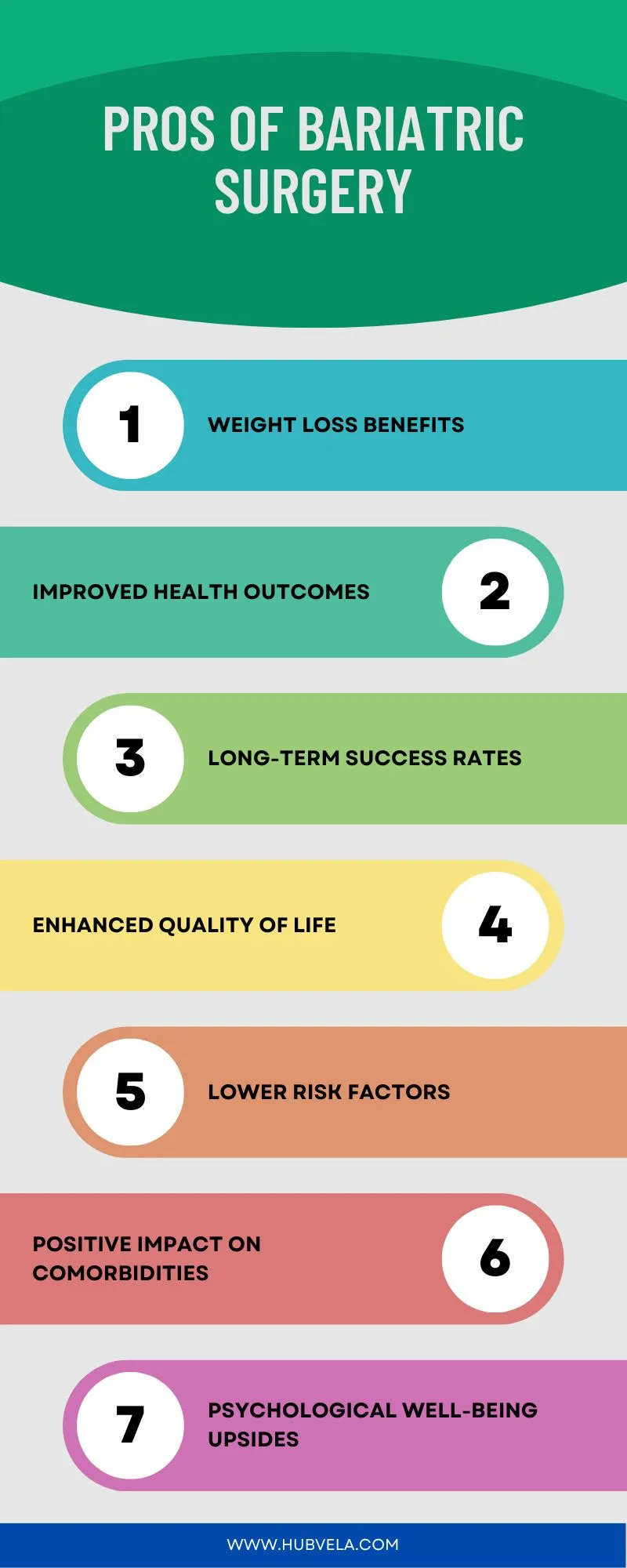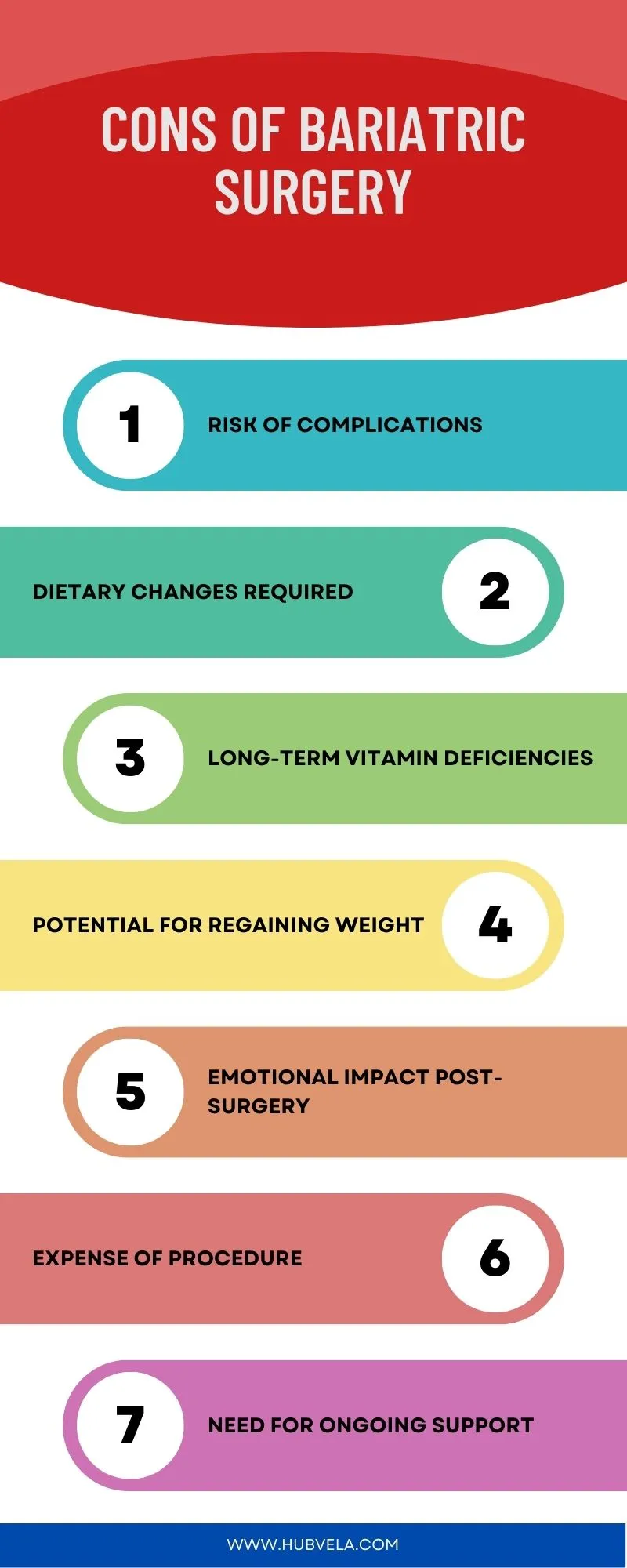Considering the growing interest in transformative weight management procedures, you may have contemplated the option of bariatric surgery.
While this choice can lead to significant changes in your life, it’s crucial to weigh the advantages and potential drawbacks carefully.
From the promising weight loss benefits to the emotional toll it may take, bariatric surgery offers a mixed bag of outcomes that warrant thoughtful consideration.
Whether you’re seeking a long-term solution or concerned about the potential challenges post-surgery, exploring the pros and cons of bariatric surgery is essential for making an informed decision.

--Advertisement--
Pros Of Bariatric Surgery
Bariatric surgery offers life-changing benefits for individuals battling obesity, leading to improved health and quality of life.
This transformative procedure not only aids in significant weight loss but also addresses associated medical conditions such as type 2 diabetes, hypertension, and sleep apnea.
By exploring the advantages of bariatric surgery, patients can make informed decisions about their journey towards better overall well-being.

1. Weight Loss Benefits
Experiencing significant weight loss is one of the primary benefits of undergoing bariatric surgery. Following the procedure, you can expect to see substantial reductions in excess body weight.
This weight loss can lead to improved overall health, increased mobility, and a higher quality of life. Bariatric surgery is particularly beneficial for individuals who’ve struggled to lose weight through traditional methods like diet and exercise.
The surgery helps kickstart your weight loss journey, making it easier to maintain a healthier weight in the long term.
Shedding excess pounds can also reduce the risk of obesity-related health conditions, such as diabetes, heart disease, and sleep apnea. Embracing this weight loss journey through bariatric surgery can positively transform your life.
2. Improved Health Outcomes
Undergoing bariatric surgery can significantly enhance your overall health outcomes. Beyond weight loss, this surgical procedure often leads to improvements in obesity-related conditions like type 2 diabetes, sleep apnea, high blood pressure, and high cholesterol.
Many patients experience a reduction in medication requirements and sometimes even remission of these conditions.
Bariatric surgery has also been linked to a decreased risk of heart disease, stroke, and certain cancers. Patients often report increased mobility, energy levels, and overall quality of life post-surgery.
3. Long-Term Success Rates
Achieving long-term success after bariatric surgery involves maintaining healthy lifestyle habits and regular follow-up appointments with your healthcare team.
Studies show that individuals who undergo bariatric surgery often experience significant and sustained weight loss over the years.
Long-term success rates for bariatric procedures, such as gastric sleeve or gastric bypass, are promising, with many patients maintaining a healthier weight for extended periods.
Bariatric surgery has been linked to improvements in obesity-related conditions like type 2 diabetes, high blood pressure, and sleep apnea.
4. Enhanced Quality of Life
To truly appreciate the benefits of bariatric surgery, consider how it can significantly enhance your overall quality of life. Beyond weight loss, many individuals experience improvements in their physical health, such as reduced joint pain and better mobility.
This can lead to increased energy levels and the ability to engage in activities that were previously challenging. Bariatric surgery often results in enhanced mental well-being, boosting self-confidence and reducing feelings of depression or anxiety related to weight issues.
Many patients also report improvements in social interactions and relationships as they feel more comfortable and confident in social settings.
5. Lower Risk Factors
Lowering your risk factors for various obesity-related health conditions is one of the significant benefits of opting for bariatric surgery.
By undergoing this procedure, you can significantly reduce your chances of developing serious conditions such as type 2 diabetes, heart disease, high blood pressure, and sleep apnea.
Bariatric surgery helps in not only achieving weight loss but also in improving overall health outcomes. The surgery aids in decreasing the excess weight that puts strain on your body, leading to a lower risk of obesity-related complications.
This reduction in risk factors can enhance your quality of life by allowing you to engage in physical activities more comfortably and enjoy a healthier lifestyle.
6. Positive Impact on Comorbidities
Improving your overall health outcomes through bariatric surgery includes a positive impact on comorbidities such as type 2 diabetes, heart disease, and sleep apnea.
Bariatric surgery has been shown to significantly improve or even resolve these conditions in many patients. For instance, after surgery, individuals with type 2 diabetes often experience better blood sugar control and reduced reliance on medication.
Similarly, the risk factors associated with heart disease, such as high blood pressure and cholesterol levels, tend to decrease post-surgery. Conditions like sleep apnea, which are commonly linked to obesity, can also see improvements.
7. Psychological Well-Being Upsides
Experience a significant boost in your psychological well-being following bariatric surgery. Many individuals report feeling a renewed sense of confidence and self-esteem after the procedure.
Losing excess weight can lead to improved body image and a more positive self-perception. With weight loss, you may also notice a reduction in symptoms of anxiety and depression.
Achieving significant weight loss goals can enhance your overall mood and quality of life. Bariatric surgery not only transforms your physical health but also has a profound impact on your mental well-being.
Embrace the emotional benefits that come with shedding excess weight, and take pride in the positive changes you experience in your psychological state post-surgery.
Cons Of Bariatric Surgery
Bariatric surgery offers life-changing weight loss solutions for individuals battling obesity. However, it’s crucial to understand the potential drawbacks associated with these procedures.
This concise article explores the cons of bariatric surgery, highlighting common challenges that patients may face.
These risks must be weighed against the benefits when considering this transformative medical intervention.

1. Risk of Complications
Bariatric surgery poses a significant risk of complications that patients should be aware of before undergoing the procedure. While the surgery can lead to successful weight loss, there are potential risks involved.
Complications may include infection, blood clots, excessive bleeding, and adverse reactions to anesthesia. In some cases, patients may experience leaks from the surgical connections, bowel obstructions, or hernias.
Nutrient deficiencies, such as iron, calcium, and vitamin D, can also occur post-surgery, requiring lifelong supplementation. It’s important to understand that bariatric surgery isn’t without risks, and complications can arise even with proper care and follow-up.
Discuss these risks thoroughly with your healthcare provider to make an informed decision about undergoing bariatric surgery.
2. Dietary Changes Required
Making significant changes to your diet is a crucial aspect of adapting to life after bariatric surgery. Following the procedure, you’ll need to transition to a diet that focuses on lean protein, vegetables, fruits, and whole grains while avoiding high-calorie, sugary, and fatty foods.
Portion control becomes essential, as your stomach’s reduced size can only accommodate small meals. You must also commit to eating slowly and chewing thoroughly to prevent discomfort and aid digestion.
Certain foods may need to be avoided entirely, such as carbonated beverages, tough meats, and foods high in sugar or fat, to prevent complications. Adhering to these dietary changes is vital for successful weight loss and overall health post-surgery.
3. Long-Term Vitamin Deficiencies
To maintain optimal health post-bariatric surgery, it’s crucial to be aware of the potential long-term vitamin deficiencies that may arise due to changes in nutrient absorption.
The altered digestive system can lead to reduced absorption of essential vitamins like B12, iron, calcium, and vitamin D over time. These deficiencies can result in various health issues if not managed properly.
Vitamin B12 deficiency, for example, may cause fatigue, nerve problems, and anemia. Iron deficiency can lead to weakness and decreased immunity.
Calcium and vitamin D deficiencies may result in bone-related problems like osteoporosis. Regular monitoring of vitamin levels and supplementation as prescribed by your healthcare provider is essential to prevent long-term complications.
4. Potential for Regaining Weight
Considering the potential for regaining weight post-surgery is a crucial aspect to understand before undergoing bariatric surgery.
While bariatric surgery can lead to significant weight loss initially, there’s a risk of weight regain over time. Factors such as poor dietary choices, lack of exercise, or not following post-operative guidelines can contribute to weight regain.
The stomach pouch can stretch if large portions are consumed, diminishing the surgery’s effectiveness. Psychological factors like emotional eating or unresolved issues can also impact weight maintenance.
It’s essential to have a realistic understanding that bariatric surgery is a tool that requires a lifelong commitment to healthy habits to sustain weight loss and prevent regaining excess weight.
5. Emotional Impact Post-Surgery
Understanding the emotional impact post-surgery is crucial for individuals considering bariatric surgery, as it can significantly influence their overall well-being and long-term success with weight management.
While bariatric surgery can lead to positive physical changes, the emotional journey post-surgery can be challenging.
Some individuals may experience feelings of loss or grief related to changes in their relationship with food. Adjusting to a new way of eating and coping with stress without turning to food can also be emotionally demanding.
There may be social and psychological adjustments required, such as dealing with reactions from others or addressing underlying emotional issues that contributed to weight gain.
Seeking support from mental health professionals or support groups can be beneficial in navigating these emotional challenges.
6. Expense of Procedure
The cost of undergoing bariatric surgery can be a significant financial burden for many individuals seeking weight loss treatment.
Bariatric surgery expenses typically include pre-operative consultations, the surgery itself, hospital fees, post-operative care, and potential follow-up treatments.
The total cost can vary depending on factors such as the type of procedure, the surgeon’s experience, the hospital’s location, and any complications that may arise during or after surgery.
Insurance coverage for bariatric surgery also varies, with some plans covering the full cost, while others require substantial out-of-pocket expenses.
There may be hidden costs such as nutritional supplements, counseling, and lifestyle changes post-surgery.
Before committing to bariatric surgery, it’s crucial to thoroughly research the expenses involved and consider all financial implications.
7. Need for Ongoing Support
Effective long-term success after bariatric surgery often necessitates ongoing support from healthcare professionals, family members, and support groups.
Following the procedure, you may encounter various challenges such as adjusting to new eating habits, managing potential complications, and coping with emotional changes.
Having a strong support system can significantly impact your journey towards a healthier lifestyle. Healthcare professionals can offer guidance on nutrition, monitor your progress, and address any concerns that arise.
Family members and support groups can provide emotional encouragement, share experiences, and help you stay motivated.
Without ongoing support, you may find it challenging to navigate the post-surgery phase alone, potentially hindering your progress and overall success in maintaining weight loss.
Conclusion on Pros And Cons Of Bariatric Surgery
Overall, bariatric surgery can be a life-changing option for individuals struggling with obesity. The pros include significant weight loss and improvement in overall health, while the cons may include potential risks and complications.
It’s important to carefully weigh the benefits and risks, and consult with healthcare professionals to determine if bariatric surgery is the right choice for you.


